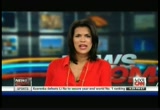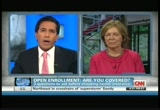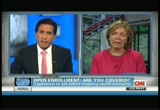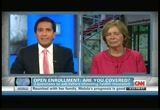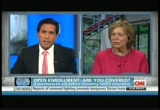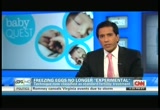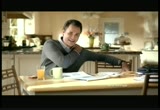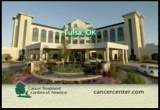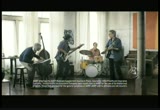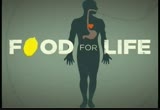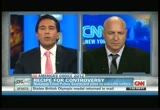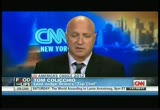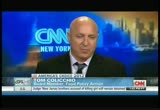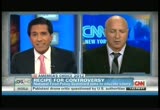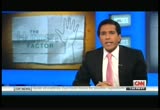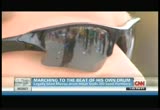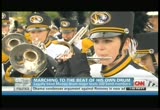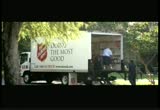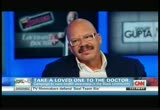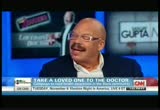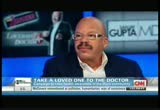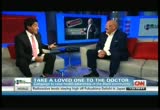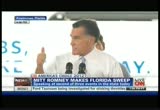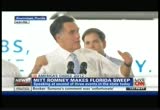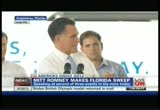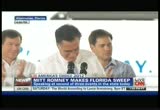tv Sanjay Gupta MD CNN October 27, 2012 4:30pm-5:00pm EDT
4:30 pm
particularly on monday. fredricka? >> all right, thank you for the heads-up on that one, bonnie. we'll cover it throughout the evening. meanwhile, at 4:40, eastern time, mitt romney will schedule a rally, and we'll bring you sanjay gupta, which starts right now. hey, there, and thank you for joining us. well, there is some fascinating new guidance out there on fertility and freezing eggs. we'll sort that out for you. also, the top chef stopping by to tell me how your vote, this election could also tell us how to enjoy safety and healthier foods. also, tom joiner coming by with a healthy message everybody needs to hear out there. but first, i want to put your health insurance options out there under the microscope. you know what happens every year around this time? many of us are confronted with having to make some crucial decisions about our medical care. about our health insurance.
4:31 pm
you get those things in the mail. i can tell you, even as a doctor, all that paperwork, all of those numbers can be overwhelming. it is a lot to sift through. so here to help us navigate this mind-boggliing information. >> hi. >> you know, i sift through this as a consumer, the number of choices people have can vary. but for a number of people with choices in health insurance, you say there are key questions to ask themselves, like what? >> well, the first one is don't base your choice on how you -- or what you do when you're healthy, because you wouldn't need much medical care when you're healthy. you don't buy the health insurance for all the days your health is not on fire, you buy it for the day when your house burns down. so you have to think about the worse case scenario. and this year, we have a new tool for that, something called
4:32 pm
the summary benefits and coverage. it is brought to you courtesy of obama care. it is basically a nutrition-packed label for health insurance, where every plan has to lay out their features in a standard way. you can compare them side by side, so you can really see what you're buying. >> right, i just want to clarify, when you talk about this worse case scenario, you're not saying -- i mean the idea of prevention, having the adequate care for that as well, you want it to be part of your plan. >> well, all the health care plans have to cover that. so that is not a problem. you want to have the shots, that is per visit. and the real money in health care, the real expenses come if you get hit by a bus or get cancer or have a medical catastrophe, so what we advise is, take this, multiply it by
4:33 pm
12, and look for the number on the first page of it, called an annual out-of-pocket limit. this is the most you will have to spend a year on things like deductibles, co-pays and insurance. and it can add up fast if you get really sick. so you want to add that out-of-pocket limit, to determine how much you will spend on premiums that year. and that will be the maximum outlay you have for health care for that year. >> a lot of people look at the cost, saying the basic monthly premium, that is what i'm basing it on, you said that before. it is a bad idea. why? >> it is a big mistake because there are so many other things involved. look, insurance companies are not charities. they have to make their money some way. and if you have a choice of plans, the other has a lot lower premium than others, you have to look again at the summary benefits and coverage and figure
4:34 pm
out why it is. either it has a lot higher deductible, a larger co-insurance, where you may have to pay a larger part of your bill, say 20%, 30%, it may leave out things such as generic drugs, but you really have to understand what you're getting yourself into. >> and prescription drugs, some people have to buy a separate plan for prescription drugs. is that pretty clear when you sign up for the programs, if you need additional coverage that way? >> well, most employer coverage incorporates prescription drug coverage. but again, the most important thing you need to do is make sure you have all the drugs covered. don't make the mistake of taking a plan that only covers generic.
4:35 pm
>> here is one thing to consider, can i afford being in a catastrophe? the worst case scenario, as nancy described, you want to plan for that. two, am i buying this based on a premium. not a good idea. two, do they include prescription drugs, not always, thank you for joining us. >> and big news in the world of fertility, as well to tell you about. the american society of reproductive medicine says that egg freezing should no longer be considered experimental. this could mean that insurance will be more likely to pay. there is controversy around this as you can imagine. they say the technique is proven to be safe and effective. but they also say this, healthy women shouldn't freeze their eggs just to prolong fertility. they say it should only be used for women with fertility issues. now many specialists disagree
4:36 pm
with that. >> unfortunately, getting married later, having children later, this is a problem -- doing this fertilization is an option for them today. >> that is worth pointing out, fertility is different for of woman. but if you have questions or concerns, talk to your doctor. also coming up, a new way to tell if your senator or congress person is putting their vote where their mouth it. that is up next. [ male announcer ] it started long ago.
4:38 pm
it's called passion. and it's not letting up anytime soon. at unitedhealthcare insurance company, we understand that commitment. so does aarp, serving americans 50 and over for generations. so it's no surprise millions have chosen an aarp dicare supplement insurance plan, insured by unitedhealthcare insurance company. like all standardized medicare supplement plans, it helps cover some of what medicare doesn't pay. to find out more, call today.
4:39 pm
4:40 pm
new candidate. i do want to tell you about a new score card. this actually ranks members of congress based on how they voted, on something that is very important to me, food. and joining me from new york, top chef tom caliccio, thank you for joining us. i'm a big fan of much of your work, and now this is very interesting to me, as well. the group is called "food policy action," and you just announced it this week, the organization is by the environmental working group and several other activists and leaders, and nonprofits. people paying attention for the first time may ask, how does congress fit into this in terms of making a difference and how well we eat? >> true, i think this is a real value issue. if you value and want to understand sort of where your food is coming from, are really interested in food safety and are interested in farm and families and keeping them together. if you're interested in the environment and interested in
4:41 pm
labelling food, then your values are, you know, if you lie somewhere in there you want a place to go where you can check to see if your elected representatives are voting your values. >> and the other thing you brought up, i read it in your report, do you think that the government should subsidize, how big a difference do you think it would make in terms of what people pay? that is the question they have. >> right, it would definitely drive the prices down. if you want to feed your family organic, it is very expensive. definitely out of the reach of low income people. but yet, a lot of us feel that nutritional foods should be easy and affordable to obtain. so if you're taking 20 billion a year and using it to subsidize corn, wheat and soy, that could cheap those things feet. if you take the subsidize, and
4:42 pm
more people could afford them. it just makes good food policy, i don't think people connect what they're eating, prices at the supermarket or at a farmer's market, the decisions that politicians are making. >> you said at the beginning, food is not a partisan issue. i agree with it, but looking at the rankings, they do seem to favor democrats just looking at them. why do you think that is? >> i don't know, that is not for me to figure out. but i think that you know, possibly, there are clearly a lot of votes in here for snap dollars, that are usually things like food stamps that are usually championed by progressives. i say usually, because a lot of republicans scored above average, as well. and so i think that is probably why. but i think again, hopefully, that -- before our politicians are casting votes, they will
4:43 pm
think about it. they know they're getting graded on it. so that is our goal here, we hope that people vote for the constituencies, and if they care about issues there are places they can go and get the information now. and hopefully, the politicians will think twice about how they're voting on these issues. >> and you bring up the food stamp program, george mcgovern died this past week, a liberal democrat. but he helped to found the food stamps, or at least expand it, at least, with the help of bob dole. >> exactly, with bob dole, this goes back to the late '60s and '70s, a film that they actually saw, hunger, that quite frankly embarrassed a lot of people and opened their eyes through some of the issues that were going on. and very quickly, they reached across the aisle and got together the modern food safety net. so again, i don't think this is partisan at all. we fixed hunger back in the
4:44 pm
early '70s, it almost didn't exist, we could do it again. this is not an issue like global warming that is so difficult to figure out. a lot of people know how to fix this, we need to pay attention to it. we can definitely fix hunger in this country. >> i can't tell you enough, as a doctor and parent, it affects us all. >> thank you, i appreciate it, good talking to you. >> a 22-year-old college senior, paul headings, has spent years trying to put his life back together. at 17, he dreamed to be a baseball player. instead, he had a difficult medical condition about to change his life forever. but he refused to let it steal his dreams.
4:45 pm
as a drum major for marching mazzou, from the famious marchig band, his dream was disappearing. >> september 7th, 2007, just barely into my junior year of high school. >> the 17 woke up, and his world was changing. >> everything was just a little blurry, didn't seem like something was wrong. >> but something was very wrong, his retinas were detaching in both eyes. >> i didn't know what i would do, i could potentially go completely blind. >> he says it was not caused by disease or trauma, but by genetics. >> it happened to my mom, my grandmother, even my little sister is having trouble. >> they didn't lose much vision, but paul, on the other hand is
4:46 pm
legally blind, sight in his left eye can't be corrected beyond 2200. >> my left eye has blind spots, the peripheral vision is great. >> he can read, by digitally scanning books into a computer. he says family and friends and music saved his life. he joined his high school drum line, taking the music home. magnifying it, memorizing it. >> here we go, b-flat. >> i just strapped up my boots and went to work. >> he made the mazzou drum line by first playing intervals, and then clinched the coveted drum major spot. most didn't know he was behind. he suffered three detachments and cataracts, one has been
4:47 pm
removed. he has had ten laser procedures. >> i could walk away from here today, and something could happen. and i could lose vision. >> he hopes this time on the ladder will change the perception of visually impaired people. >> i want to be able to say here when i leave here that i did something special. and that i didn't let this hold me back. >> and that is why we do the human factor. paul headings, just a great story. and another man doing something is special, tom joiner, with a plan to get more african-american men to visit their doctor, we'll be right back after this. [ whispers ] real bacon... creamy cheese... 100 calories... [ chef ] ma'am [ male announcer ] progresso. you gotta taste this soup. 100 calories... [ chef ] ma'am [ female announcer ] some people like to pretend a flood could never happen to them. and that their homeowners insurance protects them.
4:48 pm
[ thunder crashes ] it doesn't. stop pretending. only flood insurance covers floods. ♪ visit floodsmart.gov/pretend to learn your risk. we don't let frequent heartburn come between us and what we love. so if you're one of them people who gets heartburn and then treats day after day... block the acid with prilosec otc
4:49 pm
4:51 pm
disciplin . i had parents that died early, at an early age. and my thing is, is that i don't want to do that to my children. so if i can keep on top of my health, as much as i can, i'll be able to see my grandchildren. >> and who doesn't want that? i'll tell you, we talk about this on the show all the time, how important it is to go to the doctor to get that care. the guy you just saw was part of the "take a loved one to the doctor" health fair festival. tom talked about this, thank you for joining us, nice to meet you here in person. >> thank you, dr. gupta. >> how did this all start? >> i feel fine. >> you came for the check-up. you look well. >> thank you. >> how did this festival, this fair start? >> well, we started this ten years ago. the show tries to emphasize and take care of all of the issues
4:52 pm
that affect the african-american community. one issue that affects the african-american community disproportionately, is health, so in our community, we don't like to go to the doctor. so we came up with a -- came up with one day, and we said okay, take a loved one to the doctor on this day. and whatever you have to do, if you have to drag them, if you nag them, sometimes you have to. and so that is -- that is the way it all started out. >> you know, it is interesting, when you compare men and women, men are 70% less likely to go see a doctor, versus women. the gender gap. and african-american men, they are 10% less likely to go see the doctor, even on top of that. why is that? i mean, this is an obvious question, why do you think that is, if you drill down on that?
4:53 pm
>> we're stupid. >> they want help, on your show, people are thirsty for information and content, why don't they go to their doctor? >> we just don't want to go. we don't want to be stuck, opened up, looked at. and we're macho, and o-- like i said, basically, we're just -- we know, because -- what we're supposed to do. but it takes a loved one, especially in the african-american community, women will go get checked. >> right. >> women will go get checked in the african-american community. men, not so much. it takes a woman to get that husband, father, that son. that grandfather, you know, come on, man, you got to -- there is something wrong with you. >> you yourself are 62 years old, i know you have a busy schedule. i was just talking to you, you have a busy schedule, how are you doing in terms of your
4:54 pm
health. >> i am doing good, i do all the right things, i eat vegetables, i work out. >> is that right? >> yeah, i have a lot of staff to help. >> people to help you out. you said every day, between dallas and chicago for several years you racked up many frequent flier miles. >> i would do the morning show, get on the plane, go to chicago, do the afternoon show and then fly back for the next morning show. and i did that for eight years. >> that is an incredible schedule, i admire you, i have a busy schedule so i need somebody like you. real quick, when you go to the things in philadelphia, did you get a sense of you're making a difference? >> yeah. >> what do you hear? >> i hear things like -- when we had 400 people to see -- against our 60 dinners that we have, that 90 people had to make
4:55 pm
appointments for referrals, two or three people had to go to a clinic right then and there. when we had somebody whose blood sugar was over 1600 and had to be rushed to the hospital, right then, right there, at the health festival, that making me feel real, real good. >> well, i hope you continue to beat the drum on that. we'll do our part, as well. >> thank you, dr. gupta. >> thank you. and last but not least, chasing life to a 100. costs less, could add years to your life. hi everyone, i'm don lemon, let's go live to florida and mitt romney. >> i see somebody over there, the pink hands, the five-point plan, paul ryan and i have a plan to get the economy going and get rising take-home pay. and our plan, our plan has five points. and you have heard me talk about it before. let me remind you what they are.
4:56 pm
number one, we're going to take full advantage of our oil, our coal, our gas, our nuclear, our renewables. we're going to get more energy, more jobs. and by the way, when energy is inexpensive and plentiful, it brings manufacturing back, lower prices at the pump, i guess you don't use heating oil in florida, lower prices for electricity. it also means jobs. i guess with abundant energy, manufacturing comes here, as well. we want more trade, lots of people selling goods and services around the world, there are opportunities for people to sell goods to latin america, and i'm going to make that happen. number three, number three, we're going to make sure our people have the skills they need to succeed so our training
4:57 pm
programs work better, and our schools are good. number four, i mentioned we're going to balance the budget. and number five, we're going to champion small business. we want to help small business. [ cheers and applause ] >> you know, small business is where two thirds of the jobs in america were created over the last 15 years. but unfortunately, under the obama administration, the number of new business start-ups is at a 30-year low. and that is because they put so many burdens on small businesses. a lot of entrepreneurs have said boy, i'm not going to risk my life savings to start a business right now, given how tough the environment is. i was with the founder of a big chain, papa john, i don't think you have heard of him. he said i don't think i would have started a company in the type of environment we have
4:58 pm
today. i want to make sure america is a place you want to start a business. people come here from all over the world, for opportunities, a chance to build for themselves. and their children. and i want to help them. i was with -- i was with one guy in st. louis, who had a small business. an electronics business. and he said that he and his son calculated how much money they were paying in taxes of what they earned. now, it is not a big business. four people, four employees. he said when they calculated their income tax, and then their payroll tax, and then their state income tax, then their gas tax, and then their real estate tax, it was over half of what they made. and he said think about this, we take a big risk to start a business. and then if we're one of the lucky ones where the business succeeds, the government wants to take half of what we make. so what i want to do, i want to lower the tax rates for small business. [ cheers and applause ]
4:59 pm
>> and i want to -- i want you to know, for business to work you have to have regulations and rulings. but i want to reportings to recognize their job is not just to catch the buy guys, as important as that, is, but also to encourage people -- small business has something right now that scares the dickens out of them. and that is obama care. that is one reason we have to get rid of it. now, for us though do those five things, is going to create 12 million jobs in america. and with that type of job growth you will see employers having to pay higher wages, to hire capable people. and that means incomes will start to go up. that is how this whole thing works. this is how free markets work. we'll get more people hired, and rising take-home pay.
165 Views
IN COLLECTIONS
CNN Television Archive
Television Archive  Television Archive News Search Service
Television Archive News Search Service 
Uploaded by TV Archive on

 Live Music Archive
Live Music Archive Librivox Free Audio
Librivox Free Audio Metropolitan Museum
Metropolitan Museum Cleveland Museum of Art
Cleveland Museum of Art Internet Arcade
Internet Arcade Console Living Room
Console Living Room Books to Borrow
Books to Borrow Open Library
Open Library TV News
TV News Understanding 9/11
Understanding 9/11